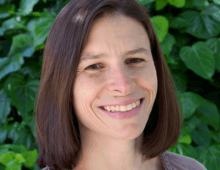Susannah Tringe of the Genomics Division and DOE’s Joint Genome Institute. Tringe investigates the sequencing and characterization of natural communities of microbes and their roles in processes ranging from biomass degradation to efficient production of biofuels from non-food crops. Her Early Career award from the Office of Biological and Environmental Research is for her proposal “Microbial…
Berkeley lab second campus in the Daily Californian
The six sites that made the final cut from a list of more than 20 potential sites in the Bay Area are Alameda Point in the city of Alameda, Berkeley Aquatic Park West in West Berkeley, Brooklyn Basin in Oakland, properties already occupied by the lab in Emeryville and Berkeley, Golden Gate Fields and Richmond…
Poplar rust fungal genome project in Western Farm Press
The sequencing of the genetic codes of wheat stem rust pathogen (Puccinia graminis) and poplar leaf rust pathogen (Melampsora larici-populina) is expected to help researchers develop control strategies to address worldwide threats to wheat fields and tree plantations. The study, published in the Proceedings of the National Academy of Sciences, was a six-year collaborative effort of…
Poplar leaf rust fungal genome project on KRVN
Wheat stem rust causes major epidemics of both barley and wheat worldwide. A strain known as Ug99 has spread across Africa and into Central Asia, and has been able to overcome most of the stem-rust-resistant wheat varieties developed over the past 50 years. Poplar leaf rust can cause significant losses in poplar tree plantations. Poplar…
JGI’s Susannah Tringe Receives Prestigious $2.5M DOE Early Career Research Award
WALNUT CREEK, Calif.—The U.S. Department of Energy (DOE) Office of Science Early Career Research Program has awarded a grant to DOE Joint Genome Institute scientist Susannah Green Tringe to conduct genomic studies of microbial communities (metagenomes) in restored wetlands around the San Francisco Bay-Delta region of California. Tringe, who heads the DOE JGI Metagenome Program,…
JGI Science @ the Lesher in The Oakland Tribune
The researchers, who will speak Monday evening at the Lesher Center for the Arts in Walnut Creek, are working with the Joint Genome Institute in Walnut Creek, a federal facility for genetic sequencing of microbes and other life-forms. The terrestrial ecosystem, meaning everything on land — from plants to soil and other geological features —…
Selaginella genome project in Biofuels Journal
Published online May 5 in Science Express, a team of researchers from over 60 institutions, that included DOE JGI’s Dan Rokhsar and Igor Grigoriev, the senior authors of this work, reported the genome sequence of Selaginella moellendorffii and used a comparative genomics approach to identify the core genes that are likely to be present in a common ancestor…
Selaginella genome project on redOrbit
Grigoriev noted that the Selaginella genome helps fill in a large gap in plant evolution from the unicellular green alga Chlamydomonas, sequenced at the DOE JGI and published in 2007, to flowering plants with vascular systems. “Selaginella occupies a phylogenetically important position for which we had no reference,” he said. “On one end of the…
Poplar leaf rust fungal genome project on Hoosier Farmers
Poplar leaf rust can cause significant losses in poplar tree plantations. Poplar is an important crop for the wood industry and is becoming increasingly important to the biofuel industry in the United States and Europe because of its rapid and significant production of biomass. Read more on Hoosier Farmers
Selaginella genome project in Western Farm Press
“There are only three families and about 1,000 species of lycophytes remaining. Selaginella has been on Earth about 200 million years,” said Banks, whose findings were published Thursday (May 5) in the journal Science. “This plant is a survivor. It has a really long history and it hasn’t really changed much over time. When you…
